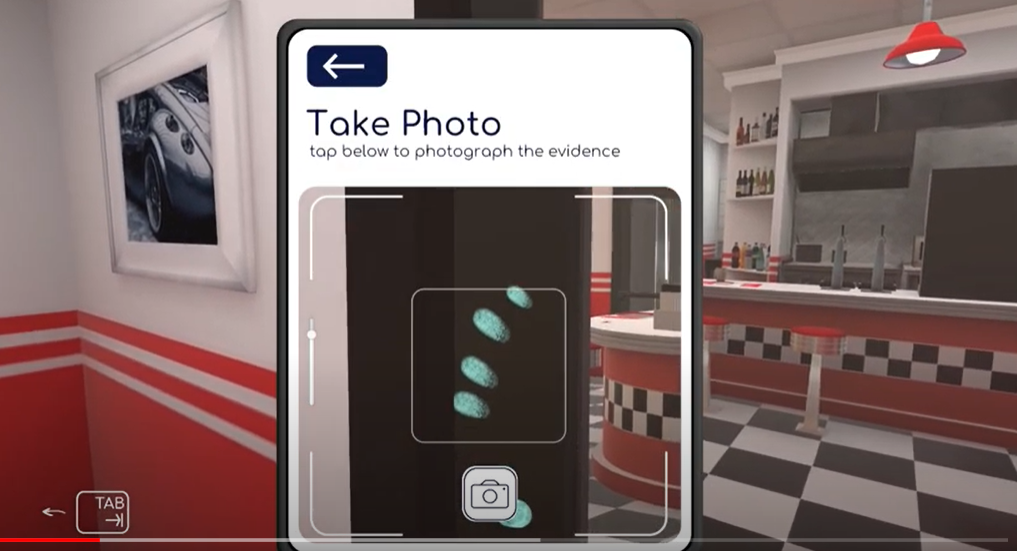Simulating real-world scenarios provides crucial experiential learning. Immersive exercises create opportunities for students to apply knowledge and skills while building confidence in abilities and critical thinking. As remote learning continues as a result of the global pandemic, Conestoga’s Digital Learning Simulations Initiative project has developed virtual tools to ensure students continue to have access to valuable hands-on training.

Students in Conestoga’s Police Foundations and Bachelor of Community and Criminal Justice programs used a crime scene investigation simulation as part of course curriculum in April. The simulation was developed by the college’s Digital Learning Simulations Initiative project to ensure continued access to valuable hands-on training.
Working in partnership with the college’s Virtual Augmented Reality Lab (VARLab), the initiative addresses a need to practice and develop essential skills outside of physical classrooms and training sites, not only as a temporary solution to real-world environments throughout the pandemic but as a new dimension to learning that will enrich theory and practice moving forward. Initially focused on simulations for trades programs, the Digital Learning Simulations Initiative project has expanded to other areas of the college, including the School of Community Services.
In early April, 140 students in the college’s Police Foundations and Bachelor of Community and Criminal Justice programs were among the first to use a new virtual reality simulation as part of course curriculum. Collaborating with XPertVR, the initiative developed a simulation that allowed students to apply deductive and investigative skills to realistic crime scenarios.
“We are deeply invested in helping aspiring policing and criminology professionals become the best in their field,” said Goranka Vukelich, executive dean to the School of Community Services. “Graduates of these programs are problem-solvers who critically apply their learning in their work with the public. We’ve intentionally designed programs to develop student capacity to reflect and adjust professional practice to achieve best outcomes, including developing muscle-memory in processing evidence as well as being prepared for some of the difficult emotions a crime scene can evoke.”
Navigating through the simulation, students explore a virtual crime scene as investigating officers. The exercise develops professional practice in a controlled environment that mitigates risk by enhancing skills that assess and identify crucial evidence and regulate emotions brought on by complex or challenging conditions. Students collect evidence, apply criminology theory and develop a working hypothesis of who committed the crime based on the story the evidence told. Multiple and randomized scenarios allow learners to rehearse and practice skills, and through generated feedback, students have the opportunity to learn from mistakes and revise strategies. Briefing and de-briefing exercises developed by faculty support learning outcomes and help connect theory to applied practice.
“After I finished the first scenario, I found myself wanting to see what would happen if I chose different options,” said Police Foundations student Chloe Pollock. “It gave me an example of what your actions could result in and whether these actions had negative consequences.”
In addition to the crime scene simulation, the Digital Learning Simulations Initiative project plans to release a traffic forensic investigation scenario later this spring. Further simulations are also in development to support firefighter training in hazardous materials recognition and containment, as well as immersive virtual realities to help train first responders in emergency scenarios. The initiative has also developed orientation and training simulations for students in the School of Hospitality & Culinary Arts that will be fully launched later this year.
“Our priority is creating safe and effective learning opportunities for students to explore making mistakes, rehearsing and gaining more confidence for when actual in-person moments on the job arrive,” explained Russell Foubert, chair, School of Applied Computer Science and Information Technology, who oversees the VARLab team. “We take a learner-first, pedagogy-rich approach to developing online simulations.”
Preview the crime scene investigation simulation online.
The college’s VARLab, launched in the spring of 2018 with support from the college’s Centre for Smart Manufacturing and Digital Innovation, specializes in creating unique training solutions for industry partners, developing new academic learning experiences and exploring new technology and trends in virtual and augmented reality.
